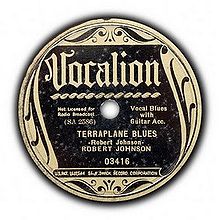
Robert Leroy Johnson was an American blues musician and songwriter. His landmark recordings in 1936 and 1937 display a combination of singing, guitar skills, and songwriting talent that has influenced later generations of musicians. Although his recording career spanned only seven months, he is recognized as a master of the blues, particularly the Delta blues style, and as one of the most influential musicians of the 20th century. The Rock and Roll Hall of Fame describes him as perhaps "the first ever rock star".
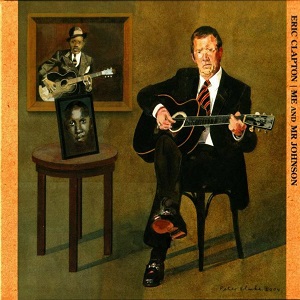
Me and Mr. Johnson is the fifteenth solo studio album recorded by Eric Clapton, released in March 2004 by Reprise Records. It consists of covers of songs written and originally recorded by Robert Johnson. The album cover was painted by Sir Peter Blake, using a series of photographs of Clapton. Clapton had planned to record an album of new material, but by the time of the recording sessions there were not enough new songs written, so the band instead recorded a series of Johnson songs.

The Terraplane was a car brand and model built by the Hudson Motor Car Company of Detroit, Michigan, between 1932 and 1938. In its maiden year, the car was branded as the Essex-Terraplane; in 1934 the car became simply the Terraplane. They were inexpensive, yet powerful vehicles that were used in both town and country. The Terraplane name was used for both cars and trucks.

"Trampled Under Foot" is a song by English rock group Led Zeppelin. A funk-influenced piece with John Paul Jones on clavinet, it was included on their 1975 album Physical Graffiti. The song was released as a single in several countries and was frequently performed in concert.

"Love in Vain" is a blues song written by American musician Robert Johnson. Johnson's performance – vocal accompanied by his finger-style acoustic guitar playing – has been described as "devastatingly bleak". He recorded the song in 1937 during his last recording session and in 1939 it was issued as the last of his original 78 rpm records.

Tommy Johnson was an American Delta blues musician who recorded in the late 1920s and was known for his eerie falsetto voice and intricate guitar playing.

Aurora "Rory" Block is an American blues guitarist and singer, a notable exponent of the country blues style.

Luke Morley is the guitarist, chief songwriter and producer for the hard rock band Thunder from 1989 to present. Previous to that he was a member of 1980s group, Terraplane who subsequently became Thunder.
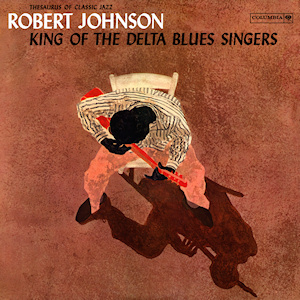
King of the Delta Blues Singers is a compilation album by American Delta blues musician Robert Johnson, released in 1961 by Columbia Records. It is considered one of the most influential blues releases. In 2020, Rolling Stone ranked it number 374 on its list of the 500 Greatest Albums of All Time.

William Bunch, known as Peetie Wheatstraw, was an American musician, an influential figure among 1930s blues singers.

"In My Time of Dying" is a gospel music song by Blind Willie Johnson. The title line, closing each stanza of the song, refers to a deathbed and was inspired by a passage in the Bible from Psalms 41:3 "The Lord will strengthen him upon the bed of languishing, thou wilt make all his bed in his sickness". Numerous artists have recorded variations, including Bob Dylan and Led Zeppelin.
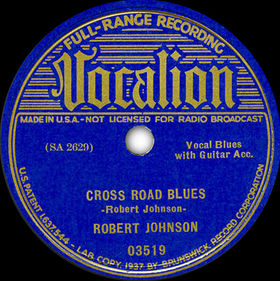
"Cross Road Blues" is a song written by the American blues artist Robert Johnson. He performed it solo with his vocal and acoustic slide guitar in the Delta blues style. The song has become part of the Robert Johnson mythology as referring to the place where he sold his soul to the Devil in exchange for musical genius. This is based largely on folklore of the American South that identifies a crossroads as the site where Faustian bargains can be made, as the lyrics do not contain any references to Satan.

"Rollin' and Tumblin'" is a blues standard first recorded by American singer-guitarist Hambone Willie Newbern in 1929. Called a "great Delta blues classic", it has been interpreted by hundreds of Delta and Chicago blues artists, including well-known recordings by Muddy Waters. Rock musicians usually follow Waters' versions, with the 1960s group Cream's rendition being perhaps the best known.

"Dust My Broom" is a blues song originally recorded as "I Believe I'll Dust My Broom" by American blues artist Robert Johnson in 1936. It is a solo performance in the Delta blues-style with Johnson's vocal accompanied by his acoustic guitar. As with many of his songs, it is based on earlier blues songs, the earliest of which has been identified as "I Believe I'll Make a Change", recorded by the Sparks brothers as "Pinetop and Lindberg" in 1932. Johnson's guitar work features an early use of a boogie rhythm pattern, which is seen as a major innovation, as well as a repeating triplets figure.
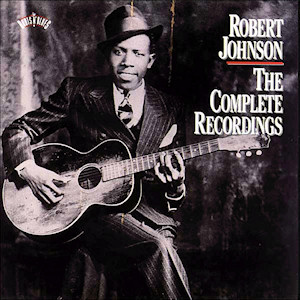
The Complete Recordings is a compilation album by American Delta blues musician Robert Johnson. The 41 songs were recorded in two sessions in Dallas and San Antonio, Texas for the American Record Company (ARC) during 1936 and 1937. Most were first released on 78 rpm records in 1937. The Complete Recordings, released August 28, 1990, by Columbia Records, contains every recording Johnson is known to have made, with the exception of an alternate take of "Traveling Riverside Blues".
"Walkin' Blues" or "Walking Blues" is a blues standard written and recorded by American Delta blues musician Son House in 1930. Although unissued at the time, it was part of House's repertoire and other musicians, including Robert Johnson and Muddy Waters, adapted the song and recorded their own versions.

Elijah Wald is an American folk blues guitarist, music journalist, and a blues, pop, and cultural music historian. He is a 2002 Grammy Award winner for his liner notes to The Arhoolie Records 40th Anniversary Box: The Journey of Chris Strachwitz.
Terraplane is an automobile built by the Hudson Motor Car Company between 1932 and 1939.

American blues musician Robert Johnson (1911–1938) recorded 29 songs during his brief career. A total of 59 performances, including alternate takes, were recorded over a period of five days at two makeshift recording studios in Texas. Producers selected 25, which Vocalion Records issued on 12 two-sided 78 rpm record singles between 1937 and 1939. These went out-of-print, but were the only source of Johnson's work until his recordings were eventually issued on albums beginning in 1959. In addition to those on the original singles, another 17 recordings have been released.
